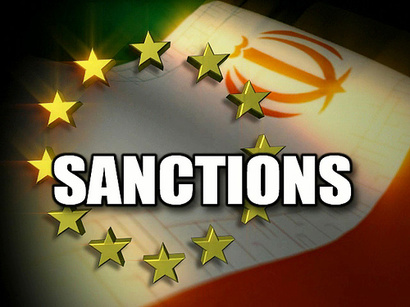US imposes sanctions on four Iranian companies, blacklists two companies

By Sara Rajabova
The U.S. Secretary of State imposed sanctions on four Iranian nuclear support companies and one individual as Weapons of Mass Destruction Proliferators and their Supporters pursuant to Executive Order (E.O.) 13382, according to the official website of U.S. State Department.
These entities and individual were designated because they provide the Iranian government goods, technology, and services that increase Iran's ability to enrich uranium or construct a heavy water moderated research reactor, both of which are activities prohibited by UN Security Council Resolutions, U.S. State Department Spokesperson Patrick Ventrell said in a press statement on Thursday.
According to statement, these designations generally prohibit transactions between the named entities and any U.S. person, and freeze any assets the designees may have under U.S. jurisdiction. This action was taken in light of the ongoing concerns that the international community has with respect to Iran's nuclear program, which Iran continues to refuse to address.
"The designations of these entities and individual pursuant to E.O. 13382, carry consequences under the Comprehensive Iran Sanctions, Accountability, and Divestment Act of 2010 (CISADA). Foreign financial institutions that facilitate significant transactions to or from the sanctioned entities and individual are exposed to potential loss of access to the U.S. financial sector. We urge financial institutions to act in a manner that preserves their access to the U.S. financial system by cutting financial ties to these companies and individual," the statement said.
Iranian private sector firms should heed the risks incurred by conducting business with those who support Iran's proscribed nuclear activities and should choose to focus their activities on legitimate international commerce, the statement added.
It also noted that the U.S. will continue to investigate and research similar activities and additional companies making material contributions to the Iranian government's proliferation of weapons of mass destruction or their means of delivery will likely be designated.
The Individuals and Entities Designated on Thursday by the Department of State Pursuant to E.O. 13382 include: Aluminat (Aluminat Production and Industrial Company), Pars Amayesh Sanaat Kish, Parviz Khaki, Pishro Systems Research Company and Taghtiran Kashan Company.
In meantime, the U.S. has put two international companies on its blacklist for helping Iran bypass oil sanctions.
The U.S. Treasury Department announced on Thursday that it has blacklisted the recently formed Sambouk Shipping FZC, a company based in the United Arab Emirates, saying it is linked to Dimitris Cambis, a Greek shipping magnate, who has been accused of helping Iran sell its oil despite the sanctions.
In March, the Treasury imposed sanctions on Cambis and his Impire Shipping Limited, claiming that he secretly operated a shipping network on behalf of Iran to get around sanctions on the country's oil sector. The Greek businessman has denied the allegation.
The Treasury Department also slapped sanctions on the joint Iranian Venezuelan Bi-National Bank, claiming that it had helped obscure Iran's oil deals.
However, despite the new sanctions by the U.S., they don't give the desired results, as Iran continues its nuclear program.
Recently, the Congressional Research Service (CRS), a nonpartisan research arm of the U.S. Congress, has released a report questioning the efficacy of U.S. efforts to dissuade Iran from developing its nuclear program through sanctions.
While noting that the sanctions have harmed the Iranian regime, CRS said they don't compel the key Iranian leaders to reach a compromise with the international community on its nuclear program.
The economic ramifications have been real and punishing: oil sales from Iran have halved, the country has experienced a dramatic decline in GDP and collapse in currency, and the government's operating budget is in flux such that it can't seem to pay many of its bills. But protests against these changes have not come to pass, emboldening the government to continue on its nuclear path, CRS claims.
"The strategic effects of sanctions might be abating as Iran adjusts to them economically and advertises the adverse humanitarian effects," the report charges. "Sanctions do not appear to have reduced Iran's influence or strategic capabilities in the Middle East." Government affiliates are bartering through front companies as a response, and wealthier citizens have turned to real estate as the rial has effectively collapsed.
"Traders are using informal banking exchange mechanisms and, benefiting from the fall in the value of Iran's currency, sharply increasing non-oil exports such as agricultural goods, minerals, and industrial goods," CRS report said.
"Some argue that Iran might even benefit from sanctions over the long term by being compelled to diversify its economy and reduce dependence on oil revenues," the report added.
On the other hand, despite sanctions Iran continues to strengthen its military power by unveiling new weaponry.
The CRS report also said that Department of Defense and other assessments indicate that sanctions have not stopped Iran from developing some new weaponry indigenously.
Moreover, Iranian officials downplay the effects of the Western embargoes against Tehran, saying the Iranian nation has managed to turn the sanctions into opportunities for further progress.
Washington and its Western allies accuse Iran of trying to develop nuclear weapons under the cover of a civilian nuclear program, however Iran denies the charges and insists that its nuclear program is for peaceful purposes only.
Tehran says that the country has always pursued a civilian path to provide power to the growing number of Iranian population, whose fossil fuel would eventually run dry.
Here we are to serve you with news right now. It does not cost much, but worth your attention.
Choose to support open, independent, quality journalism and subscribe on a monthly basis.
By subscribing to our online newspaper, you can have full digital access to all news, analysis, and much more.
You can also follow AzerNEWS on Twitter @AzerNewsAz or Facebook @AzerNewsNewspaper
Thank you!
